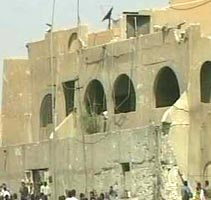|
11
killed, 57 wounded in Baghdad Embassy Blast
 |
|
The
blast is the first to hit a foreign embassy since the end of the
U.S.-British offensive
|
Additional
Reporting Sobhy Haddad, IOL Correspondent
BAGHDAD,
August 7 (IslamOnline.net & News Agencies) - Eleven people were
killed and 57 wounded in a car bomb explosion outside the Jordanian
embassy in Baghdad Thursday, August 7, hospital sources said.
A
Kia pickup truck exploded outside the embassy at around 11:00 a.m.
(0700 GMT), shattering the embassy's façade and windows of dozens of
neighboring houses, IslamOnline.net correspondent said.
The
injured included passers-by, a number of Jordanians and Iraqi embassy
staff, in the first explosion to hit a foreign embassy since the end
of the U.S.-British offensive.
Ahmad
Kadun, in charge of the morgue at the Iskan children's hospital, said
the facility had received 11 bodies from the attack, two of which had
been rapidly claimed by relatives for burial, reported Agence
France-Presse (AFP).
Deputy
hospital director Nawfal Soliman had previously given a death toll of
11, before revising it downward to seven, including two Iraqi civilian
men, one woman and a child, an Iraqi policeman and two Jordanians.
He
said the hospital had 40 wounded, two of them seriously.
A
doctor at Baghdad's Yarmuk hospital said it had admitted 17 injured
patients, six of them in serious condition.
A
medical source said three Jordanian embassy staffers had been
transferred from Iskan to a Jordanian hospital at Fallujah, 50
kilometers (30 miles) west of Baghdad.
In
Amman, Jordanian officials denied that any Jordanians had been killed.
They said 15 people employed at the embassy had been hurt, but did not
specify how many were Jordanian.
However,
a senior Jordanian official told AFP the blast was caused by a car
bomb and missiles, adding that 10 of the injured were Jordanian staff
and five were Iraqi employees of the embassy.
"According
to the information we have received, rockets were fired on a car
packed with explosives, triggering the blast," the Jordanian
official who declined to be named said.
Charge
d'affaires Demi Haddad was not in the embassy at the time of the
attack, an officials said.
Embassy
Stormed
Meanwhile,
dozens of angry Iraqis stormed the Jordanian embassy after the deadly
blast, tearing up the Jordanian flag and ripping up and burning
pictures of King Abdullah and his father, the late King Hussein.
The
crowd yelled curses against Jordan and Jordanians, saying "We
want to kill them all," an AFP correspondent witnessed.
The
protestors also shouted slogans against the Jordanian decision to
give host to ousted President Saddam Hussein’s daughters few days ago.
But
Suleiman Khairallah, a Jordanian writer, ruled out links between the
blast and allowing a refuge for the Saddam daughters in the country.
"The
decision to open the doors to the two sisters was taken on a
humanitarian ground, without any political purposes," Khairallah
told Al-Jazeera.
But
Areeb Al-Rentawi of the Al-Quds Center for political Studies blamed it
on "a number of Iraqi parties who launched a wave of criticisms
against the kingdom in recent days."
He
named the Iraqi National Congress (INC) as one of those "who
widely and openly criticized Jordan."
The
INC is led by Ahmed Chalabi, who had fled to London from Jordan after
he was sentenced in absentia to 32 years in prison over charges
of embezzling millions from the bank he owned.
When
U.S. troops and Iraqi police arrived, about 30 minutes after the
explosion, the crowd was forced out amid shouting. The troops yelled
at them as they left, but even outside the embassy, the crowd spotted
a Jordanian embassy employee and started hurling rocks at him.
Police
escorted the employee to safety and U.S. soldiers fired a warning
shot, forcing the mob to disperse.
More
Detentions
The
explosion came few hours after the U.S. occupation forces detained 49
people overnight, General Raymond Odierno, the head of the 4th
Infantry Division (4th ID), said Thursday.
"One
was a Fedayeen leader arrested in Tikrit, one was a former regime
loyalist in Tikrit, and two were former associates of (Saddam's sons)
Qusay and Uday in Kirkuk," Odierno was quoted by AFP as saying.
The
general estimated that Saddam was running every one to six hours as
his network of followers was slowly being picked apart by U.S. troops.
"I
think he is on the run, moving every hour to six hours, he could be in
the area," Odierno said.
The
United States blames Saddam’s followers for the almost daily attacks
on its forces in Iraq.
But
as anti-American sentiments are on the rise among local inhabitants, a
number of unorganized resistance groups claimed responsibility of the
attacks in an effort to drive the occupation forces out of their
country and precipitate the formation of a national representative
government.
|